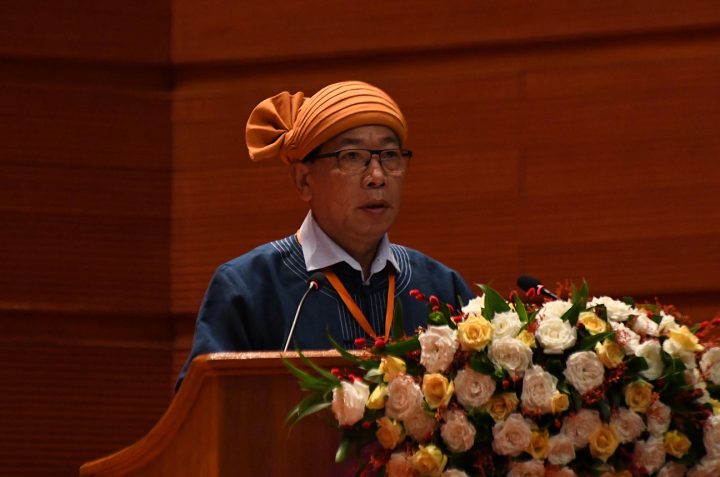20 August
I wish for the mental and physical wellbeing of everyone in attendance at this conference. I am grateful for the opportunity to represent the Shan Nationalities League for Democracy at this 4th Session of the Union Peace Conference – 21st Century Panglong.
It is my understanding that this Union Peace Conference is an endeavour to end the prolonged armed conflicts in Myanmar through national reconciliation. It is the simple objective of rejuvenating the lapsing national development and pushing it forward. We are now at the fourth session of the Union Peace Conference and we have reached as far into our journey as we should have. But it would not be wrong to assume we have not gone as far as we have hoped to. I realize we need to continue trying hard. Everyone is aware that we cannot choose our neighbouring countries but our ancestors selected their neighbors back in 1947 to come together as one nation, one house and that choice was a fascinating milestone in Myanmar’s history.
They chose to form a united nation by signing the Panglong Agreement in 1947 and consequently created the Union of Myanmar we are all living in now. From that point on we all became akin to brothers and sisters living under one roof. All the people living under the roof of the Union of Myanmar, for better or for worse, will have to live peacefully with one and another. Thus, it is paramount that there is equity among the rights, equality, freedom and opportunities among thdifferent groups. From a certain perspective, the union we are living in right now is in essence the newly formed union created by the Panglong Agreement in 1947. Tagaung and Bagan is a chapter in history created by a certain ethnic group in the past because the other ethnic groups living together in the nation have their own unique history and happenings. We need to see that we are writing a new history for the new union and even more so while we focus on national reconciliation.
As we have chosen to live together with different ethnic groups in a nation it is not as easy to choose again. We decided to live together from 1948 and there is no other choice than to exist peacefully together into the future. We must not isolate any one organization or ethnic group in Myanmar’s society. It is not a right thing to do and no one will accept it as well. I have noticed people saying there is no other choice than to encourage love for one’s own country. Patriotism is an essential quality and inherent to every ethnic group from birth. But with a nation housing as many ethnic groups as we do, it is certain we will have different definitions of patriotism. If we each hold on to our own brand of patriotism then it will be difficult to reconcile with each other. The only spirit that can unite the different sense of patriotism across the ethnic groups is the love and patriotism towards the union. I believe we need to put that spirit first and our different sense of patriotism second.
It is not individual patriotism but the love of our union that will lead the way for national reconciliation and establish solidarity as well. And from there, we deeply believe we can implement union peace.
It is also unacceptable that a single group should have greater control of the nation and even more so in a nation that houses so many different ethnic groups. Anyone who meets the criteria should be given the opportunity to lead regardless of their ethnicity. I urge you to create a nation that is shared among the ethnic groups living in it together.
The proliferation of a national identity centred on a single ethnic group while ignoring the identities of other ethnic groups cannot be dragged any longer in a more open-minded age like the present. As the patriotism of a single ethnic group is elevated for long, other ethnic groups would gradually try to reestablish their own culture and patriotism. While that can be seen as a positive factor the reality now is that there is less priority for issues concerning the entire nation and more focus on the issues of each of our own ethnic group.
We must realize that the organizational and single ethnic identity issues trumping the need for the affairs of the union to be placed first is a huge challenge for establishing unity. The truth is all ethnic groups are yearning for equality and as that remains unsuccessful the demands will keep growing. There is nothing to lose in advocating for equality. We only need to have kindness in our hearts.
I want us to view this peace conference as a means to fully implement the details of the Panglong Agreement signed in 1947. I do not wish it to be a conference that aims to overshadow and nullify the Panglong Agreement, as some people fear. I sincerely urge everyone to not allow that to happen.
It is my belief that we need to swiftly establish the national reconciliation that is necessary to our union. We are all aware of the economic delays caused by COVID-19 and our situation being placed between the power struggle of two geopolitical powers. It is a worrying predicament for our nation that has a lot of conflict. It is similar to foreign diseases evading when the immune system is weak. We need to build up our immune system and the only way to do that is to quickly implement national reconciliation.
May we succeed in swiftly building union solidarity and with those words of peace, I conclude my speech. Thank you everyone.
(Translated by Zaw Htet Oo)



